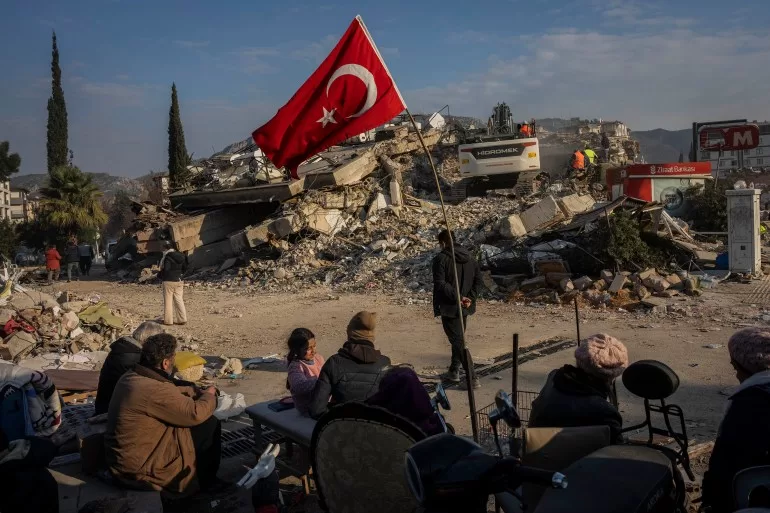The city lies near the North Anatolia faultline, a geological danger that has seen Istanbul hit by at least 34 strong earthquakes over the last 2,000 years.
Smaller tremors can be felt by people in Istanbul every year – an ominous reminder of the danger that lurks beneath their streets.
For many, witnessing the stark devastation caused to swaths of Turkey last February added to their anxiety over the inevitable but unpredictable arrival of “the big one”.
Istanbul’s official population is 16 million, but estimates based on household water consumption by the Istanbul Metropolitan Municipality put the figure at 20 million.
The vast majority of residents live in apartment buildings of five storeys or taller in compact neighbourhoods with few open spaces.
Those built before 1999 – the year a powerful earthquake in the eastern Marmara Sea rocked Istanbul, killing 18,000 people – are considered particularly at risk. Officials say such buildings account for two-thirds of the city’s construction.
But spiralling property prices mean that even those who fear their building is unsafe cannot afford to move out.
Mayor Ekrem Imamoglu said economic circumstances – annual inflation currently stands at 65 percent – impeded “saving the city from a tragedy”.

The municipality has checked 35,000 buildings to measure their earthquake resilience, but many residents are unwilling to submit to the tests.
“Sixty-five percent of people who are offered rapid scanning don’t let us in,” Imamoglu told journalists recently. “Their concern is what they will do if they find out the building isn’t safe.”
Damage on the scale of the quake that hit last year, as well as a potential tsunami, would have catastrophic effects not just for the city but also the country.
Istanbul is Turkey’s finance and trade powerhouse – last year it accounted for more than half of Turkish exports – and such a blow would ravage the country’s economy.
Okan Tuysuz, a professor at Istanbul Technical University’s Eurasian Earth Sciences Institute, said the North Anatolia fault could be expected to generate a quake of magnitude 7.5.
“Serious damage may occur in Istanbul, especially on the coasts facing the Marmara Sea,” he said.
Focus on urban transformation
With this in mind, the city’s disaster preparedness is set to be a key issue ahead of nationwide local elections in March.
Murat Kurum, the mayoral candidate for President Recep Tayyip Erdogan’s Justice and Development Party (AK Party), is aiming to recapture Istanbul from Imamoglu, the Republican People’s Party politician who took it in 2019.
“We see that this time the focus of the campaign is earthquake and urban transformation,” Ozer Oz, a board member of Istanbul’s Chamber of Civil Engineers, said.
“However, the earthquake danger for Istanbul has not just emerged. It is a threat that we have felt is approaching every day since the 1999 earthquake and that grows bigger every day.”
Kurum served as minister for environment, urbanisation and climate change between 2018 and 2023, a role central to preparing Turkey’s cities for disaster.
But he was accused of mismanagement after last year’s earthquakes.
Critics highlighted a building amnesty during his period in office when more than three million building registration documents were issued across Turkey to those who paid a fine rather than bringing their buildings up to code.
But in a wide-ranging list of campaign pledges delivered on January 25, Kurum promised that “not a single risky building will be left in Istanbul” if he is elected.
He said 650,000 new homes would be built during his five-year term and another 250,000 renovated through supporting homeowners and the private sector.
The former minister accuses Imamoglu of subjecting Istanbul residents to “five lost years” of mismanagement.
Imamoglu has also received criticism from opposition circles. Birol Aydin, of the Saadet Party, accused him of “squandering the opportunity that was presented to him on a golden platter” in 2019.

“You said that all buildings will be checked for earthquake risk,” Aydin said. “However, not a single municipal employee has visited hundreds of thousands of buildings.”
Imamoglu, meanwhile, says there are 200,000 risky buildings – housing three million people – that are in urgent need of transformation.
Since winning office five years ago, he has initiated schemes to improve the quality of Istanbul’s housing stock but says his efforts have been obstructed by the “disease of partisanship” as the central government blocks funding for improvements.
“Every time we try to contact the minister, we do our best to recommend that earthquake risk needs to be the priority,” he said.
“After February 6, we thought these proposals and requests would be taken more seriously, but unfortunately this has been ignored and has been seen as a matter of politics.”
Speaking at a ceremony to hand over the keys to new housing in Kahramanmaras on the anniversary of last year’s earthquakes, Erdogan refuted claims of bias against opposition-led municipalities.
“As the government, we have sent and are sending the budget share they should receive to all municipalities, regardless of which party they belong to.”
He added: “The opposition municipalities from Istanbul to Izmir, from Ankara to Hatay cannot provide the services to their cities that they deserve … the only reason for this is incompetence, ignorance and pursuing other calculations.”
